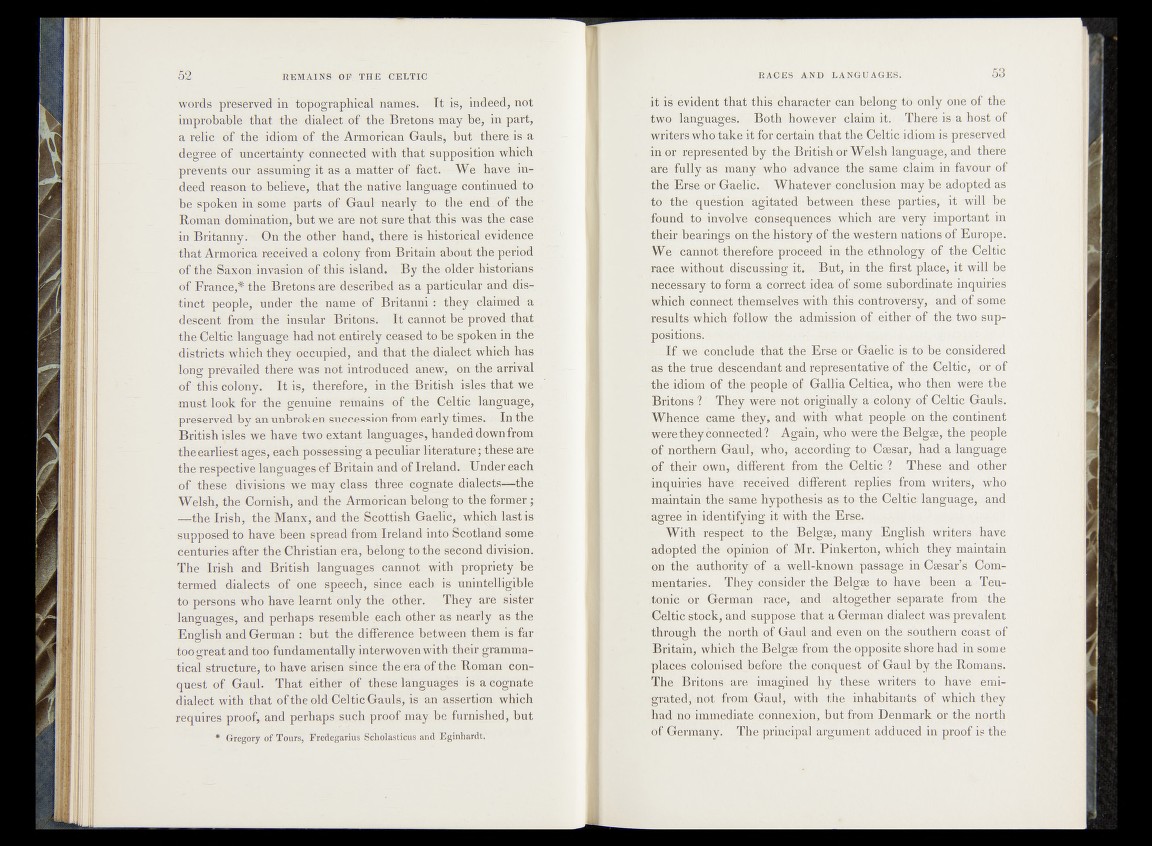
words preserved in topographical naines. It 'is, indeed* not
improbable that th e dialect, erf the Bretons may be, in part,
a relic of the idiom of the Armorican Gauls,;b u t ! therejfss'a
degfed of uncertainty connected with th a t supposition which
prevents our .assuming i t as a matter of fact. We have via-?
deed reason to-believe) that themative language continued to
be spoken in some parts of Gaul mearly to the end of the
Roman domination, but we are nofsure that this was the case
in Britannÿ. On the other hand, there is historical'evidence
that Armorica'received a. colony: from Britain about thetperiod
of fhé.’Sàxdminvasion of this island. By the: older historians
of France,* th e Bretons’are described as a particular and&fiS’-*
tinet people, under the name of B ritan n i^ th ey -claiinèd^a
descent frdnr the insular Britons, d t cannot be proved that
the Celtic language had not entirelyceased to be spoken in the
districts wffich they; occupied, and thaf -the dialect which has
long prevailed there was not introduced anew, on?t^- arrival
of this colony. It: is, therefore^ in tlrcBritish Mes- that-we
must look for the genuine remains-ôf thexGêltic fongudgC)
preserved by an unbroken successionfrom earlyjtà&jj^pî In the
British isles we have two extant languages, handd^downfrom
the earliest ages, each possessing a pecuKarf iterature ;«these are
the respective languagescf Britain and of Ireland, ïsEnder each
o f these ' divisions weTnay class three cognate dialects—the
Welsh, the Cornish, and the Armorican belon'gtto the former:;
H tih e Irish, the Manx, and the Scottish Gaelitv which last is
Supposed to have been spread from Ireland intoSeotland some
centimes after the Christian era, belong to thepsëcond division.
The Irish and British languages cannot with propriety be
termed dialects of one speech, since each is unintelligible
to persons who have learnt only the , other. They are sister
languages, and perhaps resemble each other as nearly as the
English and German : but the difference between them is far
too great and too fundamentally interwoven with their grammatical
structure, to have arisen since the era of the Roman conquest
of Gaul. That either of these languages is a cognate
dialect with that of the old Cel tic Gauls, is an assertion which
requires proof, and perhaps such proof may be furnished, but
* Gregory of Tours, Fredegarius SchSlasfticuS and ‘Egînnardt/
it is evident that this' character can belong tb only one of the
two languages.' Both however claim it. There is a host of
writers who take it--for certain th a t the Celtic idiom is preserved
in or represented by the British or Welsh language, and there
are many - who-mdvance the same claim in favour of
the-Erse.or Gaelic^: Whateveh'conclusion maybe adopted as
to the-, question' agitated between these parties, it will be
found to;^|nvolve’fConsequences,which are very important in
their bearings oil the hi story,of the Western nations of Europe.
We cannot therefore proceed in- the- ethnology of the Celtic
race withQut-^disjèussing -it. But, in the first place, it will be
tóeeèssary to form a correct idbafpf 'some,subordinate inquiries
which connect themselves with||tlws controversy, and. of. some
ffcesults^which follow the admission? o|l either of the two sup-
,positions^ '5
If wé&cö.nelude that the Erse or*Gaelic is to "be-considered
lias the true dè^deüdant and representative of the Celtic^öL/óf
th e idiom of the people p|p Gall ia Celtica,- who then were th é
Britojr#s|t?" They were not ota-gmally a-colonyjof Celtic Gaulsf,
WheM^feame- ,they, and with what people^ob the continent
I^Crethbyconnected? Again, who.were the Belgae, the people
ofokorthern Gau,l^ who, according to Cepgar, had a language
kfotheir own, different from the> Celtic-I^Tto^ei.a^d other
-inquiries have? rec^ved different replies* from writers, who
maintaih thefSaülé; hypothesis; as- to the Celtic, langtfage^and
^Lgree in identifying it witfo&e Erse.:
W ith ^ rq ^ ë e t to the Belgae) aa^afiy English .writer^ have
adopted the opinion of Mr. Pinkerton, which they maintain
on the authority of a well-known passage in Caesar’s Commentaries.
They-consider the Belgae. to have been- a :Teur
.tonic or German race, xahdrftaltogether .separate, from .the
Celtic-stock, and suppose tha^a-Getman.dialect, was prevalent
through the north? of Gaul and even on the^authern cöaSt pf
Britain, which the Belgee- from the opposite shore,had in some
places colonised, before the cqpqt^ft^of Gaul by . Ike Romans.
The Britons are imagined hy..vthese writers :to have -, emigrated,
f(hot from Gaul, with the inhabitants of which they
had no-immediate connexion, but from Denmark or the north
óf GermanjL The principal argument adduced in proof is the